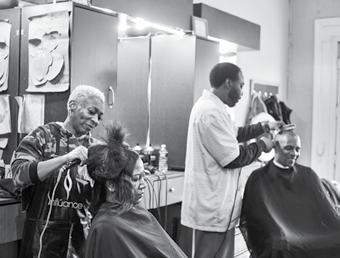
5 minute read
Voices
from INDY Week 3.4.20
by Indy Week
BACKTALK By the time this week’s paper hits the streets, you’ll know the results of North Carolina’s primary—barring a recount or some unforeseen craziness. So instead of digging into our still-full inbox of election-related emails, we’ll catch up on some other stuff we’ve missed.
The Plot to Control America, Part 1 If you can’t win at the ballot box, make it harder for your opponents to vote
BY JONATHAN WEILER @jonweiler
Two weeks ago, Nick Williams visited Sister Liu’s Kitchen for a short piece on the best dumplings in the Triangle. (We highlighted the story on our Durham cover.) In the comments, KRISTIN RESURRECCION says our privilege was showing: “I picked up a copy of the INDY because I saw that Sister Liu’s was on the cover, and I was glad because I thought they deserved it. But then I read the article and thought, they deserve so much better than this. “Nothing about this off-hand assessment of Sister Liu’s is rooted in any real knowledge of Chinese food and culture. It’s not a crime to be ignorant of a culture not your own, but the utter lack of humility and self-awareness in this article is pretty off-putting. Is it really that much of a magical mystery that the best food from non-dominant cultures isn’t often found in Downtown, USA? And, I’m sorry, but the secret to Sister Liu’s dumplings is that they’re not over-reliant on MSG? Is this so-called MSG-reliance a thing you look for when assessing all the dishes you review, or do you save that especially for dishes from Asian restaurants?”
Last month, Leigh Tauss wrote about a Raleigh City Council committee considering new regulations for short-term rentals, and a meeting at which former council member STEF MENDELL opposed them. “Once again, you slant your reporting to promote an agenda,” Mendell writes. “I did not bring up the ‘zombie houses’ issue—council member Patrick Buffkin did but was quickly silenced by the mayor and Saige Martin. There are two very real concerns. The first is concern about investors buying up properties for short-term rentals, thereby taking them off the market for long-term Raleigh residents and exacerbating our existing housing shortage. The second is about turning residential neighborhoods into quasi-commercial zones (with the proliferation of ‘zombie’ houses). Zoning is about predictability, and for those who bought homes in residential neighborhoods, it is wrong to introduce quasi-hotels into their midst. The previous council had come up with a compromise after years of stagnation on the issue. But the majority on the current council doesn’t like compromise. It’s their way or the highway.”
WANT TO SEE YOUR NAME IN BOLD? indyweek.com backtalk@indyweek.com @IndependentWeekly @indyweek
Since the beginning of the 21st century, the GOP has tried, by various means across the country, to winnow the electorate in order to make it harder for certain groups of voters to cast ballots.
The original sin of this two-decade-long effort transpired in 2000, when a firm hired by then-Florida governor Jeb Bush wrongly purged perhaps thousands of eligible voters from the state’s voter rolls on the mistaken grounds that they had been convicted of felonies and were, therefore, ineligible to vote. In a plot twist that we would normally ascribe to a tin-pot dictatorship, that purge of mostly black voters swamped the scant 537-vote margin by which the governor’s brother won Florida that year and thereby secured the presidency.
In 2006, we learned that the Bush administration had engaged in its own purge. In a highly unusual move, it fired seven United States attorneys, ostensibly because they’d taken part in various forms of malfeasance or insubordination. But as subsequent investigations revealed, they were actually sacked for refusing to pursue bogus voter fraud cases.
The Bush administration had begun insisting that voter fraud—especially in-person fraud, in which people who were not eligible to vote showed up to cast ballots anyway—was a serious problem requiring a crackdown. In fact, every credible study of such fraud—the putative target of the “election security” laws that have passed in recent years—has found the same thing: It’s virtually nonexistent in the United States.
An early omen of what was to come occurred in Ohio in 2004. Republican Secretary of State Ken Blackwell issued a series of rules and directives that made it harder for voters to register and cast provisional ballots. One rule, for example, allowed only voter registration applications that were submitted on 80-pound stock paper; it was scrapped because of the outcry. Others sharply limiting the circumstances in which provisional ballots could be submitted and considered were altered or modified. But the intent was clear: to sow confusion and to discourage voting. The targets of these shenanigans, unsurprisingly, were disproportionately African American.
In 2006, Indiana became the first state in the country to require voters to present a valid form of photo ID.
When Americans are asked whether they support such measures, a clear majority say they do. It seems like a commonsense idea—and most Americans have photo IDs, so what’s the harm?
It turns out that, while most Americans do, between 3 and 10 percent of voters do not, and most of them are African American and Hispanic.
In a complicated split decision in 2008, the U.S. Supreme Court upheld Indiana’s law, in part on the grounds that it was not overly burdensome to voters. And the most careful studies of the impact of photo-based voter ID laws have found that they do not significantly deter turnout. However, as noted, the stated rationale for these laws is fiction. And whatever their impact, no one can reject the possibility that they affect the outcome of close elections.
In any event, the nuisance they introduce into the voting process, one borne disproportionately by people of color, is, quite simply, indefensible.
The Indiana law set an important precedent. After it was upheld by the Supreme Court in 2008, and especially after the Roberts court gutted a key provision of the Voting Rights Act in 2013, a spate of new laws, almost all passed by Republican-controlled legislatures, sought to require photo IDs and otherwise make it more difficult for targeted groups of voters to cast ballots.
Reflecting on this history, the eminent jurist Judge Richard Posner—originally appointed to the federal bench by President Reagan—the author of the appellate opinion upholding the Indiana law, has since reversed himself. In 2013, he acknowledged that the photo-ID requirement is “now widely regarded as a means of voter suppression rather than of fraud prevention” because the real intent of the Indiana law and its progeny is impossible to deny.
Next week, I’ll take a look at the 2013 ruling and the expanding voting rights battleground that has emerged in its wake.
Part 2 of this column will appear next week.
Voices is made possible by contributions to the INDY Press Club. Join today at KeepItINDY.com.










